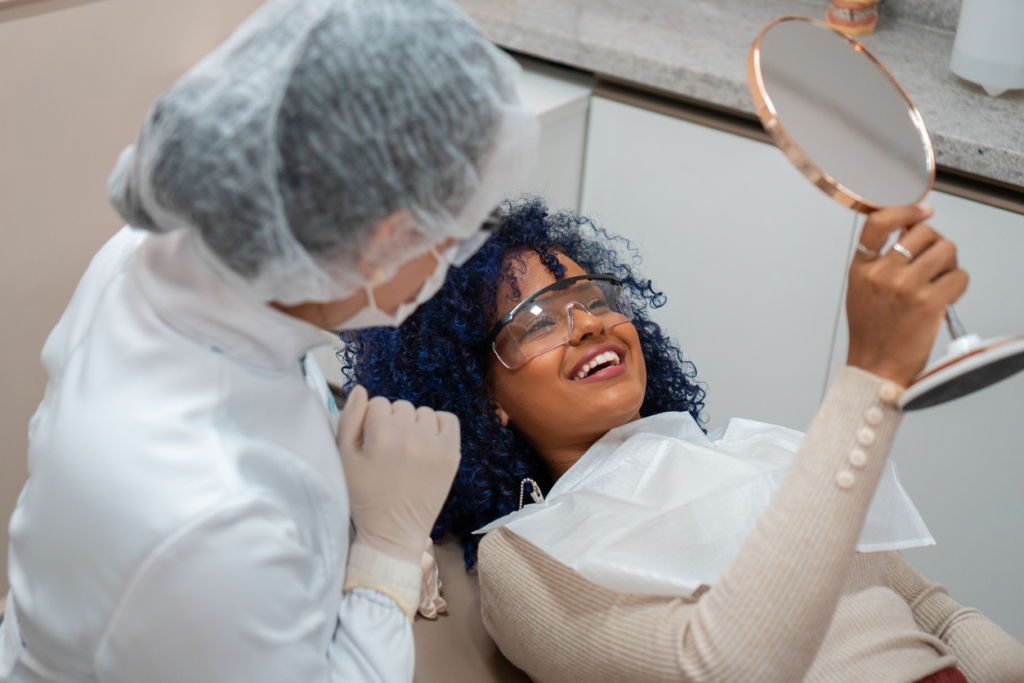Oral surgery, whether it’s wisdom teeth removal, dental implants, or periodontal surgery, requires careful attention during the healing process. The foods you choose to eat after dental surgery play a pivotal role in not only ensuring comfort but also in promoting healing and preventing complications such as disruption of the blood clot at the surgical site. To aid in your recovery, we’ve compiled a comprehensive list of soft foods and tips that are conducive to healing after an oral procedure.
Understanding The Importance Of Soft Foods Post-Surgery
After undergoing oral surgery, such as wisdom tooth extraction or the placement of dental implants, the mouth typically enters a sensitive and vulnerable state. Swelling and tenderness at the surgical site are common, requiring a diet that minimizes stress and strain on these areas to foster effective healing. The integrity of the blood clot that forms post-surgery is crucial. This clot acts as a protective barrier at the surgical site, aiding the natural healing process and preventing bacteria from entering the wound.
Why Soft Foods?
Soft foods play a pivotal role in the post-operative care regimen for several reasons:
Protection of the Blood Clot: The clot is an essential part of the healing process as it covers the exposed bone and nerves. Eating hard, crunchy, or chewy foods can dislodge this clot, leading to increased bleeding, the painful condition known as dry socket, and other complications that can prolong recovery.
Reduced Mechanical Stress: Soft foods require less chewing force, thus placing less pressure on the jaw and surgical site. This reduced strain helps maintain the integrity of the area and can alleviate pain.
Prevention of Irritation and Infection: Spicy foods or those with granular textures can irritate the wound or become lodged in it, which could lead to infection and discomfort. Keeping the diet bland and smooth helps avoid these risks.
Control of Swelling and Pain: Hot beverages and foods can exacerbate swelling and sensitivity. Consuming these at a lukewarm temperature helps manage inflammation and minimizes pain, which is essential for a comfortable recovery period.
Nutritional Considerations
It’s not just about avoiding certain types of food; it’s equally important to choose foods that support the healing process through their nutritional content. For instance, proteins are crucial for tissue repair, while vitamins and minerals such as Vitamin C and Zinc support the immune system and can help the body heal more effectively. Therefore, the selection of soft foods should also focus on their nutritional value to enhance the body’s natural healing capabilities.
Adapting To Temporary Dietary Changes
Adapting to a diet primarily composed of soft foods might be challenging initially, but it is a crucial step towards a smooth and speedy recovery. Patients are encouraged to prepare in advance by stocking up on recommended foods and planning meals that are not only nutritious but also varied and enjoyable. This helps ensure that the diet remains appealing and satisfying while providing the necessary nutrients to aid in recovery.
Why No Dairy After Dental Implant Surgery?
After dental implant surgery, it’s essential to take care of your oral health and follow your dentist’s instructions diligently. Here are some dairy products you may want to avoid immediately after dental implant surgery:
Hard cheeses: Hard cheeses like cheddar or Parmesan may be difficult to chew and could potentially irritate the surgical site.
Yogurt with fruit chunks: Some yogurts contain fruit chunks or granola, which may be abrasive and can cause discomfort or irritation to the surgical area.
Ice cream with nuts or crunchy toppings: Ice cream with nuts, crunchy toppings, or hard pieces can be challenging to consume and might cause irritation or damage to the implant site.
Spicy cheese dips or sauces: Spicy foods may cause discomfort or pain in the mouth, especially around the surgical area. Avoid spicy cheese dips or sauces that may irritate the gums.
Dairy products with added sugars: Sugary dairy products can promote bacterial growth and increase the risk of infection around the implant site. Opt for plain or unsweetened dairy products instead.
Acidic dairy products: Some dairy products, like certain types of yogurt or cheese sauces, may contain acidic ingredients that could irritate the surgical site or compromise healing.
Dairy products that require a lot of chewing: Avoid dairy products that are difficult to chew or require excessive force, as this may disrupt the healing process or cause discomfort.
Optimal Soft Foods For Post-Surgery Nutrition
When you’re planning what to eat after dental surgery, focusing on the nutritional value of your food is essential. Your body requires ample nutrients to heal efficiently. Here are some soft food recipes and suggestions that are gentle on your mouth and rich in nutrients:
Greek Yogurt
High in protein and packed with probiotics, Greek yogurt is an excellent choice to eat after dental surgery. It’s smooth, cool, and can help soothe and nourish your body without irritating the surgical site.
Smoothies
Blending your fruits and vegetables can provide you with essential vitamins and minerals while keeping the intake process gentle. Avoid adding seeds or nuts to prevent any harm to the healing tissues. Incorporate a scoop of protein powder or a spoonful of Greek yogurt for an added protein boost.
Mashed Potatoes
This comforting food can be a staple in your diet following oral surgery. Its smooth, creamy texture makes it easy to consume and it offers energy-rich carbohydrates that help fuel your body during recovery. Opt for sweet potatoes for an extra dose of vitamins A and C.
Soup
Lukewarm soups are ideal after surgery as they are easy to consume and can be packed with vegetables and soft meats to enhance their nutritional profile. Ensure that the soup is neither too hot nor spicy.
Scrambled Eggs
Eggs are a soft protein source that can be easily seasoned and prepared without spices, making them perfect for post-surgery diets. They also provide zinc, which is crucial for immune function and healing.
Cottage Cheese
Low in lactose and high in protein, cottage cheese is another excellent choice that’s easy on the stomach and beneficial for your oral health during recovery.
Applesauce
Naturally sweet and smooth, applesauce can satisfy a sweet craving without any hard textures that might disrupt the surgical site. Choosing an unsweetened variety can also help you avoid excessive sugars.
Oatmeal
Cooked until soft and lukewarm, oatmeal is a hearty option that can be topped with banana slices or a dollop of Greek yogurt to enhance its flavor and nutritive value.
Tips For Ensuring A Smooth Recovery Process

Recovering from oral surgery requires careful attention to your habits and the environment you create for healing. Here are tips designed to help you recover efficiently and comfortably.
Stay Hydrated
Hydration is a fundamental aspect of the healing process after any surgical procedure, including oral surgery. Adequate fluid intake helps keep the mouth clean, supports overall health, and is essential for the efficient function of cells and tissues involved in healing.
Water is Best: Plain water is the most effective hydrator and helps ensure that the body functions optimally. Try to consume at least 8-10 glasses of water daily.
Avoid Temperature Extremes: Drinking beverages that are too hot or too cold can lead to discomfort and potentially harm the surgical site. Lukewarm water or drinks can soothe rather than irritate the mouth.
Stay Consistent: Keep a bottle of water nearby and sip throughout the day, rather than consuming large quantities at once, to maintain steady hydration.
Avoid Spicy Foods and Hot Beverages
The foods and drinks you consume after surgery can significantly affect your recovery time and comfort levels.
Neutral is Better: Spicy foods can trigger inflammation at the healing site, leading to increased pain and a risk of complications. Stick to bland, non-irritating foods that are gentle on your mouth.
Mind the Temperature: Just as with spicy foods, hot beverages can exacerbate swelling and disrupt the healing process. Opt for room temperature or slightly warm foods and drinks to avoid irritating the sensitive areas.
Soft and Smooth: Focus on foods that require minimal chewing and are smooth in texture, like soups, yogurts, and smoothies, to keep the surgical site undisturbed.
Follow Your Dentist’s Advice
The advice given by your dental professional is tailored to your specific surgical procedure and personal health needs, making it critical to your recovery.
Personalized Care Instructions: Your dentist or oral surgeon will provide detailed care instructions tailored to the type of surgery you underwent. These might include guidelines on oral hygiene, activity levels, medication schedules, and more.
Ask Questions: If you’re unsure about any part of your recovery process, don’t hesitate to contact your dental care provider for clarification.
Adhere to Follow-up Appointments: Post-operative check-ups allow your dentist to monitor your healing and address any issues promptly. Keeping these appointments is crucial for ensuring everything is progressing as expected.
Final Thoughts
Choosing the right soft foods to eat after dental surgery is critical for a speedy and safe recovery. By focusing on nutrient-rich, gentle foods, you can help your body heal, protect the integrity of the surgical site, and maintain overall oral health. Remember, the goal is not just to eat to fill the stomach but to nourish the body and facilitate optimal healing. With careful selection and preparation of meals, you can achieve just that and pave the way for a quick return to your daily life and regular diet.
At Elite Smiles, we understand that the journey to recovery following oral surgery is crucial, and we are committed to guiding you through each step of the healing process with expert care and personalized support. Our team of dental professionals leverages the latest in dental technology and techniques to ensure your comfort and optimize your healing.
From detailed pre-surgical consultations to comprehensive post-operative care plans, we provide tailored advice, including nutritional guidance and pain management strategies. We monitor your recovery closely, offering adjustments to treatment plans as needed and answering any questions you might have. Our proactive approach at Elite Smiles not only aims to enhance your recovery but also ensures that you are informed and comfortable throughout the healing process, supporting your return to optimal oral health swiftly and safely.
Ready to experience top-tier dental care? Contact Elite Smiles today and set the foundation for a successful recovery. Let us help you smile with confidence again!

